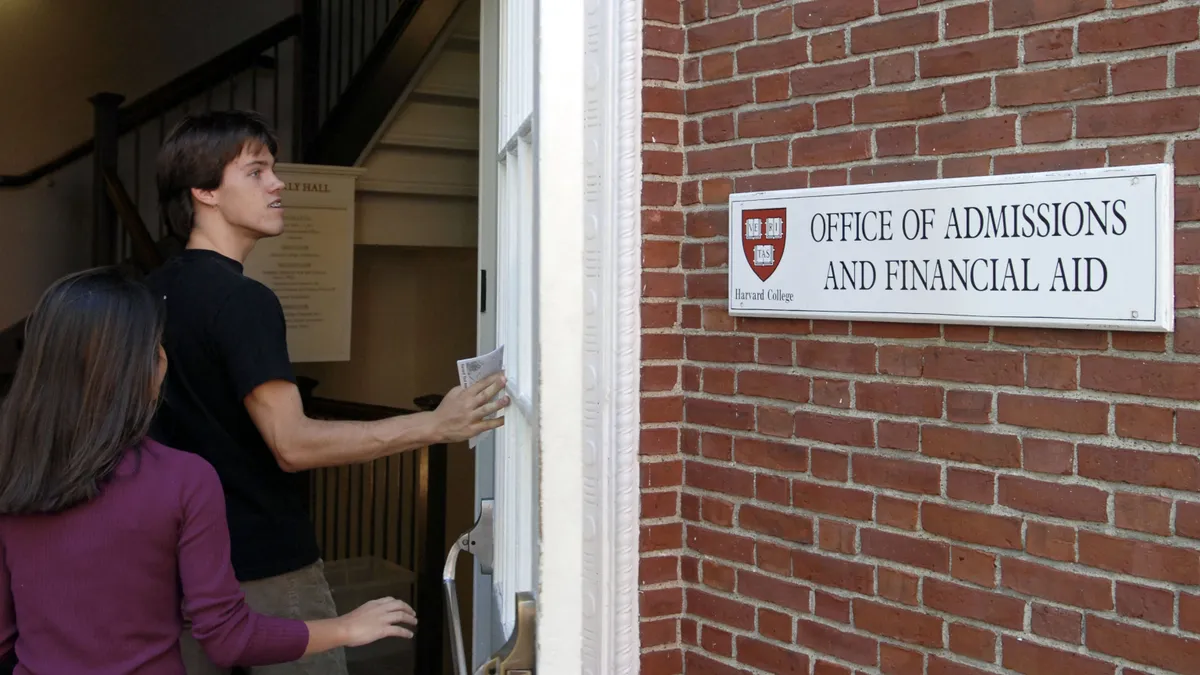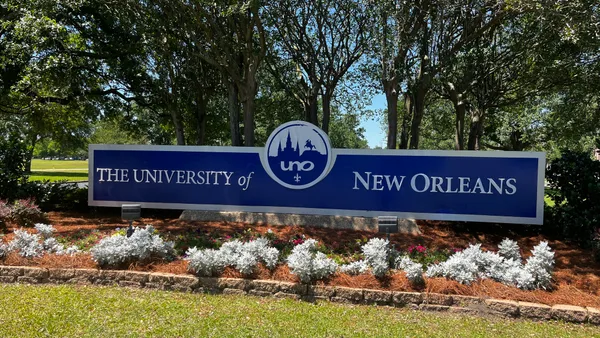Dive Brief:
- Harvard University announced Thursday that it will not require undergraduate applicants to submit SAT or ACT scores through the class enrolling in fall 2026, further cementing the likelihood such admissions policies will endure past the coronavirus pandemic.
- The Ivy League institution cited persisting pandemic-related hardships and restricted testing access as reasons for continuing test-optional admissions, which many institutions first embraced during the health crisis.
- Harvard, which did not require test scores from applicants this year or last year, is far from the only entity committing to test-optional rules. Admissions standards adopted Wednesday by the Kansas regent board allow automatic entry for applicants who have not taken the exams to the state flagship, the University of Kansas, as long as they earned a 3.25 high school GPA or higher.
Dive Insight:
As the most visible U.S. higher education institution, Harvard and its extension of test-optional policies generated widespread buzz.
The decision represents a momentous shift in the college enrollment landscape. Even a couple of years ago, it was unthinkable that such a highly selective institution would distance itself from standardized tests.
Yet Harvard and many other colleges have gone test-optional as the pandemic shuttered common testing sites. The racial reckoning underway in the U.S. also refreshed accusations the SAT and ACT slant toward wealthy students who can afford extensive tutoring and that they disadvantage historically underrepresented applicants.
Testing providers have maintained their products are not biased.
However, the new test-optional policies can confuse aspiring students and their families and stoke fears that colleges will favor applicants who submit their scores. This mindset was so palpable that last year the National Association for College Admission Counseling asked test-optional institutions to affirm that students would not be negatively affected if they did not provide their results.
Harvard on Thursday also reiterated it will treat all applicants equally.
"Students who do not submit standardized test scores will not be disadvantaged in their application process," Harvard Dean of Admissions and Financial Aid William Fitzsimmons said in a statement. "Their applications will be considered on the basis of what they have presented, and they are encouraged to send whatever materials they believe would convey their accomplishments in secondary school and their promise for the future."
In addition to Harvard's news, California State University, the largest four-year higher ed system in the U.S., appears ready to drop entrance exams entirely after its chancellor signaled support for ending testing requirements. The Cal State board of trustees plans to vote on the matter in March. This follows the University of California System abandoning admissions tests, a major blow to testing providers the ACT and College Board, which owns the SAT.
The developments compound heavy revenue losses for the testing giants, with fewer students sitting for the exams. About 1.3 million members of the high school graduating class of 2021 took the ACT, roughly 375,000 fewer than the previous year. And 1.5 million in the 2021 graduating class took the SAT, a decline of about 700,000 students from 2020.
Some students may still have reason to take standardized tests. In addition to students with a 3.25 high school GPA, the U of Kansas is providing automatic admission to applicants who score at least a 21 on the ACT and maintain at least a 2.0 high school GPA.
Elsewhere, in Illinois, a new law takes effect in the New Year prohibiting the state's public colleges from requiring in-state applicants to send in their scores.
The law is unusual. Most testing mandates among public colleges are set by higher ed governing boards, according to Bob Schaeffer, executive director of FairTest, an organization lobbying for restricted uses of standardized exams.
FairTest has tracked more than 1,800 four-year schools not requiring the SAT or ACT for students aiming to enroll in fall 2022, including those that were test-optional before the pandemic. Many of these policies are temporary, but almost no institutions that piloted test-optional admissions before the pandemic returned to their previous procedures.















